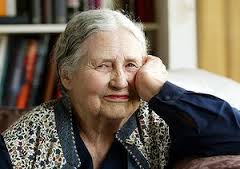The death of a writer who has been an important part of my reading life leads me to think back over how their writing has affected and influenced me, find their books on my shelves (so many shelves, so many books) and browse for a bit. Sometimes, but not often, I re-read. (There’s so much new, exciting writing calling out for attention.)
Doris Lessing, 94, died last month. Her five-novel sequence, “Children of Violence”—always, to me, “the Martha Quest stories”—changed my life. They were published between 1952 and 1969. I would have read them in the late seventies, maybe early eighties. Martha Quest, the protagonist of all five, was to me then a reflection of my unsatisfied self. Me and Martha Quest (brilliant naming!) did not know how to be ourselves in the world. The events of her life were more interesting and adventurous than mine, but she too was in a constant state of waiting, without either a map or a destination. Here’s a sentence from the third book, A Ripple From The Storm, that I had underlined: “Martha was again feeling that old pain, that she was excluded from some good, some warmth, that she had never known.” For all her unhappinesses, Martha took herself, and her own inner life, seriously. That was liberating.
And so, I revisited The Golden Notebook (1962), the novel for which Lessing is perhaps best known, and found that ten years after its publication she wrote a preface, saying how the book had been misunderstood, and everyone had missed its central theme, which is not what she calls “the sex wars”. She went on to say of course it had been misunderstood, once a book is understood it loses its value and interest. She said a couple of other things in this preface that really struck me.
One is that she wrote it straight through, as it were, from beginning to end, holding all the pieces in her mind. As it is complexly structured, that is very impressive. (In fact, the structure of The Golden Notebook anticipates the attempts of more recent novelists to do something different with the novel form.) She says it was hard. Another is her suggestion that we should warn young people that in educating them we are indoctrinating them. If only.
I remember reading The Golden Notebook. I remember Anna Wulf going mad, disintegrating, as I recall, as a kind of experiment with herself, thinking I hadn’t the courage to do that. Nowadays I am reconciled to the self I am, and not anguished about matters of selfhood and identity. The Golden Notebook, I notice, has not gone back on the shelf; it’s somehow on the to-be-read pile.
Her “Canopus in Argus” series, beginning with Shikasta, were the first science fiction I read that gave me any idea of what the genre could do to illuminate the human condition. I’m grateful for that introduction, too.
Thank you, Doris Lessing.


